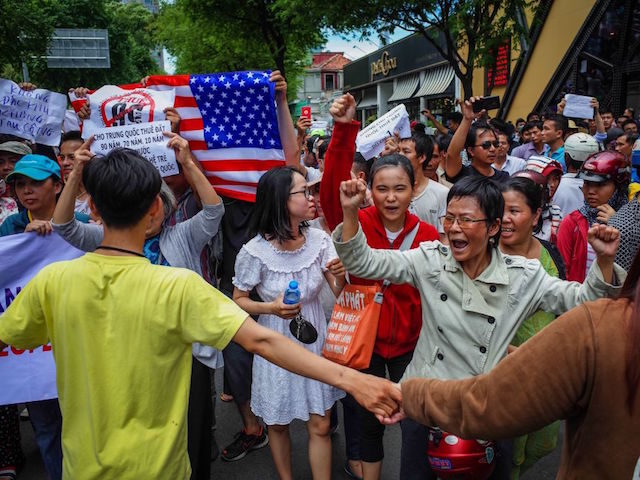China’s state media expressed concern over growing “nationalism” by “a few Vietnamese radicals” Tuesday after a weekend of anti-Chinese protests swept the nation.
Vietnamese officials arrested around 100 people throughout the country this weekend who participated in protests against a draft law that would allow foreign companies to lease Vietnamese land for 99 years, prompting concerns that China would take advantage of the deal to colonizing Vietnamese territory. China has already imposed itself in Vietnamese maritime territory, creating artificial islands and placing military assets in the Paracel Islands of the South China Sea, which international law has deemed not to be Chinese territory.
The protests against the draft lease law dovetailed by midweek into protests against a cybersecurity law that would force Google, Facebook, and other tech giants to catalog Vietnamese citizens’ behavior online and open offices in Vietnam, presumably to allow the government access to these files.
China’s Global Times issued a warning Tuesday for Vietnam to dismiss the protests over the weekend, accusing “Western media” of having “hyped up” the protests to exacerbate distrust of the Chinese government.
“The proposed special economic zone law extends the land lease period of the three special zones in Vietnam to 99 years for investors from all countries,” the Global Times notes, “But a few Vietnamese radicals clamored that the law would lead to Chinese ‘long-term occupation of Vietnamese land.'”
China is a communist country; no Chinese businesses operate independently of the Communist Party. The Global Times contends, however, that any company leasing Vietnamese land would be acting outside of the purview of Beijing, which is illegal for Chinese companies to do. “Since renters are businesses, rather than governments, it is political intrigue of outside forces to bring up the issue of sovereignty,” the newspaper alleges.
The Global Times claims that disputes in the South China Sea – where Beijing has sunken, attacked, and generally banned Vietnamese ships from Vietnamese waters – are “effectively under control” and only Western mischief would lead Vietnamese people to believe otherwise.
The newspaper particularly cites as lamentable the fact that Vietnamese people “have direct access to Western websites such as Facebook, a convenient platform for political dissidents, such as the New Vietnam Revolutionary Party, to engage in political liaison and mobilization.”
Vietnam passed a law this week that would force Facebook and Google, among other companies, to store private user data in Vietnam. The move has prompted fear among political dissidents because the communist government has used social media postings to exacerbate crackdowns against the “wrongful views” of who dare criticize the regime. Like other authoritarian regimes such as Turkey, Vietnam has also expanded its campaign to pressure social media sites to take down content critical of the government.
Protesters gathered in Saigon (Ho Chi Minh City) and Hanoi holding signs and banners reading “No leasing land to China even for one day” and other anti-China slogans. The Diplomat reports that many Vietnamese fear that well-funded Chinese corporations will begin to outbid locals for their own territory and eventually begin taking over major urban areas. One local told the Diplomat she had heard rumors that “Chinese people are behind this land-buying spree.”
Historic Day in Saigon (2018-06-10) pic.twitter.com/dFKrACvm7i
— Saigonese (@VietNamTweeter) June 10, 2018
Saigon: Viewing from above pic.twitter.com/08LW5oAhdd
— Anh Chí (@AnhChiVN) June 10, 2018
#Peaceful #protests broke out in most major cities in #Vietnam #Hanoi, #Hochiminhcity #Saigon #NhaTrang #Danang People say NO to #Cybersecurity & #SEZ draft laws pic.twitter.com/j75k6j2DRQ
— The Vietnamese (@thevnmesemag) June 10, 2018
The South China Morning Post reports that protests extended deep into the night this weekend when they became violent. Then, on Wednesday, they resumed.
“About 100 people have been arrested so far, but on Wednesday hundreds of defiant demonstrators again gathered at Tan Huong Industrial Park in the southern province of Tien Giang, holding up banners with slogans such as ‘I love the fatherland – don’t let China lease our land,'” the Post noted.
The Vietnamese legislature has moved to table the lease proposal, which has not stopped the protests.

COMMENTS
Please let us know if you're having issues with commenting.